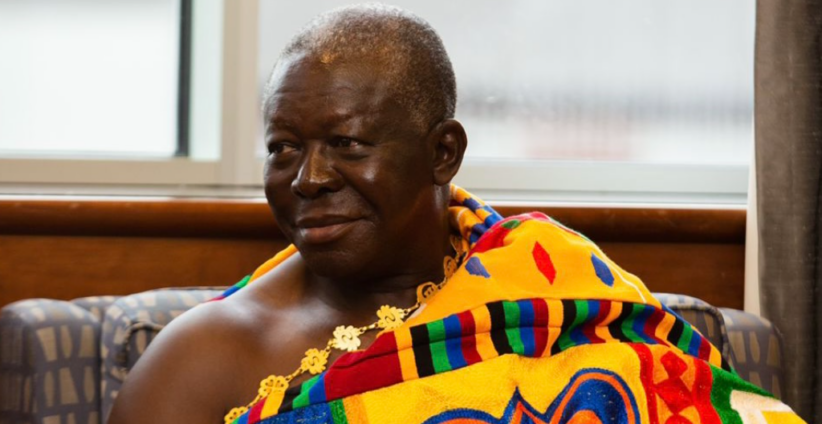A row between a prominent journalist and a king has captivated many in Ghana.
It began when Afia Pokua criticised the Ashantihene's handling of tensions with other ethnic groups, and the deference that politicians show him, and expressed her frustration about the apparent supremacy of the Asante community.
"Even the president... bowed to show respect to the chief," Ms Pokua said in an interview with Mona Gucci earlier this month on local channel Onua TV.
"Asante is not the whole of Ghana. If you are only thinking about Asante, they can amend the laws so that you can separate yourself from the rest of the country."
The comments were not well received by the traditional ruler.
The head of the Ashanti kingdom - Otumfuo Nana Osei Tutu II - occupies a powerful position in society and it is considered hugely disrespectful to openly insult or criticise him.
His official title is the "Asantehene" - but he is also referred to as "Nyame Kessie" which means greater god, and as such he is treated with maximum respect.
Royal historian Osei Bonsu Sarfo Kantanka, who works for the Asantehene, told the BBC that anybody wanting to criticise the leader must follow specific steps.
"You go through the queen mother - she is the only person who can rebuke him. If you don’t go through the queen mother and then you do it yourself, then you’re in trouble," he said.
Mr Osei also criticised Ms Pokua for saying that Otumfuo Nana Osei Tutu II, who is in his 70s, was hard of hearing.
"If you use this word on even an ordinary person, he will not take it as criticism."
Seeking to apologise for her comments, Ms Pokua on Monday went to Manhye Palace in Kumasi where the Asantehene lives.
Dressed in black and accompanied by elders, she kneeled on the ground and begged for forgiveness, as did Ms Gucci. The whole spectacle was filmed for TV.
But Ms Pokua’s apologies were rejected by representatives of the Ashanti traditional ruler and she was asked to leave the palace.
"Take your cursed self and your troubles with you. Whatever comes your way in the future, deal with it on your own. Do not ever return here," the Asantehene told her, according to local media.
That was despite her already apologising on social media and live television.
According to the royal historian, it boils down to another failure to follow etiquette.
In order for her apology to be accepted, said Mr Osei, the journalist should have appealed to the Agona traditional authority and taken along with her, her parents and the owners of the TV station that broadcast the critical remarks.
If the apology were accepted, the Agona chief would then convey the message to the Asantehene and then set a date to take her to Manhye Palace for another apology.
But, if she follows these steps now, it may not be too late.
Latest Stories
-
Give direct access to Global Health Fund – Civil Society calls allocations
3 hours -
Akufo-Addo commissions 200MW plant to boost economic growth
4 hours -
Smallholder farmers to make use of Ghana Commodity Exchange
4 hours -
I want to focus more on my education – Chidimma Adetshina quits pageantry
4 hours -
Priest replaced after Sabrina Carpenter shoots music video in his church
4 hours -
Duct-taped banana artwork sells for $6.2m in NYC
4 hours -
Arrest warrants issued for Netanyahu, Gallant and Hamas commander over alleged war crimes
5 hours -
Actors Jonathan Majors and Meagan Good are engaged
5 hours -
Expired rice saga: A ‘best before date’ can be extended – Food and Agriculture Engineer
5 hours -
Why I rejected Range Rover gift from a man – Tiwa Savage
5 hours -
KNUST Engineering College honours Telecel Ghana CEO at Alumni Excellence Awards
5 hours -
Postecoglou backs Bentancur appeal after ‘mistake’
5 hours -
#Manifesto debate: NDC to enact and pass National Climate Law – Prof Klutse
6 hours -
‘Everything a manager could wish for’ – Guardiola signs new deal
6 hours -
TEWU suspends strike after NLC directive, urges swift resolution of grievances
6 hours

